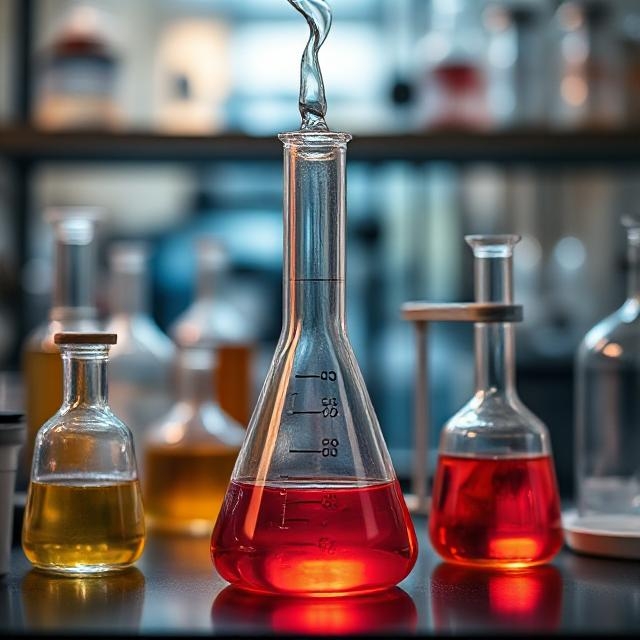Erlenmeyer Flask vs. Conical Flask: Is There a Difference?

In laboratories across the globe, glassware plays a critical role in conducting precise experiments and chemical reactions. Among the most widely recognized pieces is the flask with a broad base and narrow neck. Commonly referred to as either a conical flask or an Erlenmeyer flask, many people wonder—are these two terms interchangeable, or do they denote different laboratory tools?
Let’s explore the characteristics, applications, and subtle differences (if any) between these flasks and how Erlenmeyer flask manufacturers in India cater to growing laboratory demands.
What Is a Conical Flask?
A conical flask is a type of laboratory glassware characterized by its cone-shaped body, flat bottom, and cylindrical neck. This design provides several advantages: it allows easy swirling of liquids without risk of spillage, offers stability on flat surfaces, and is compatible with various sealing options such as rubber stoppers or parafilm.
The wide base promotes even heating of contents, making the conical flask a preferred choice in chemical labs, microbiology, pharmaceutical testing, and educational institutions.
What Is an Erlenmeyer Flask?
An Erlenmeyer flask is essentially the same as a conical flask. The term "Erlenmeyer" is derived from the German chemist Emil Erlenmeyer, who designed the flask in 1860. The design was revolutionary for its time, offering a more practical and safe alternative to the traditional beaker.
Due to its historical origin, "Erlenmeyer flask" became a common term, particularly in Western countries, while "conical flask" is more widely used in British and Indian contexts. Functionally, however, they refer to the same piece of equipment.
Are There Any Differences?
In technical terms, there is no significant difference between a conical flask and an Erlenmeyer flask. The distinction is mainly regional and linguistic:
-
"Erlenmeyer flask" is predominantly used in the United States and other parts of the Western world.
-
"Conical flask" is more commonly used in the UK, India, and Commonwealth nations.
In practical applications, both terms refer to the same flask design. The choice of terminology often depends on the country’s educational system or industrial standards.
Uses of Conical/Erlenmeyer Flasks
Regardless of the name, these flasks serve several critical purposes in scientific environments:
-
Titration: The narrow neck prevents splashing during mixing.
-
Culture Growth: Used in microbiology to cultivate microorganisms with shaking incubators.
-
Storage and Transport: Liquids can be safely sealed and stored due to the design.
-
Heating Solutions: The flask's wide base allows for stable and uniform heating on hotplates or Bunsen burners.
Given their utility, it’s no surprise that the demand for high-quality glassware has led to the growth of many Erlenmeyer flask manufacturers in India, who now serve both domestic and global markets.
Erlenmeyer Flask Manufacturers in India: A Growing Industry
India has emerged as a significant hub for scientific glassware production, including conical and Erlenmeyer flasks. These manufacturers cater to a wide spectrum of sectors—from academic laboratories and pharmaceutical companies to industrial chemical plants.
Top Erlenmeyer flask manufacturers in India focus on precision, durability, and international safety standards such as ISO and ASTM. Many companies have invested in modern manufacturing techniques like borosilicate glass processing, automated flame polishing, and strict quality assurance testing.
In addition to standard flasks, these manufacturers often provide custom solutions in terms of volume, graduation markings, and neck dimensions, ensuring versatility across different scientific requirements.
Tips for Selecting a Quality Conical Flask
Whether you are purchasing from local suppliers or working with established Erlenmeyer flask manufacturers in India, here are some key factors to consider:
-
Material: Borosilicate glass is preferred due to its thermal resistance and chemical durability.
-
Volume Accuracy: Check for precise measurement markings.
-
Finish Quality: Smooth neck rims and uniform wall thickness ensure longevity and usability.
-
Heat Resistance: High-quality flasks can withstand sudden temperature changes without cracking.
-
Compliance: Always look for certifications and adherence to international quality standards.
Conclusion
To sum up, the terms conical flask and Erlenmeyer flask refer to the same laboratory tool, with the variation lying in regional nomenclature rather than function. Their enduring utility in scientific experiments makes them a staple in virtually every lab setting.
With a robust network of Erlenmeyer flask manufacturers in India, laboratories both within the country and abroad can rely on quality and innovation to support their scientific endeavors. Whether you call it a conical flask or an Erlenmeyer flask, what matters most is the precision, reliability, and performance it delivers.
- Art
- Causes
- Crafts
- Dance
- Drinks
- Film
- Fitness
- Food
- Giochi
- Gardening
- Health
- Home
- Literature
- Music
- Networking
- Altre informazioni
- Party
- Religion
- Shopping
- Sports
- Theater
- Wellness


